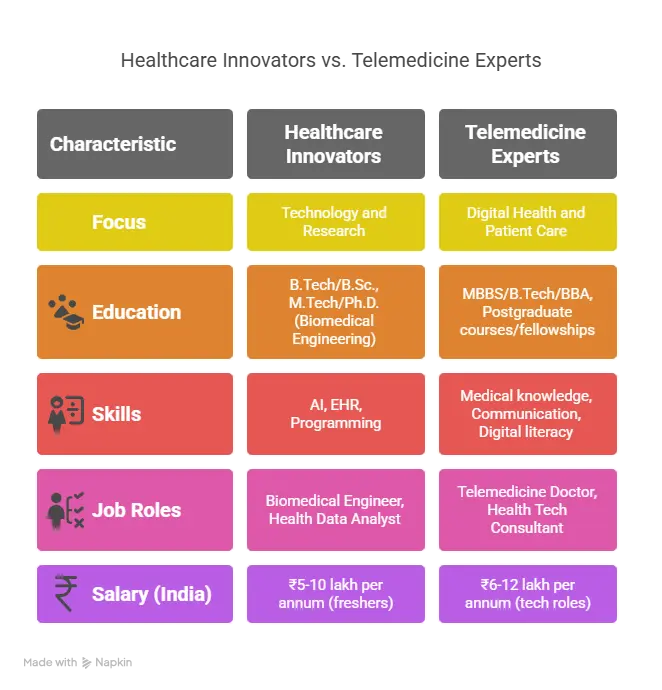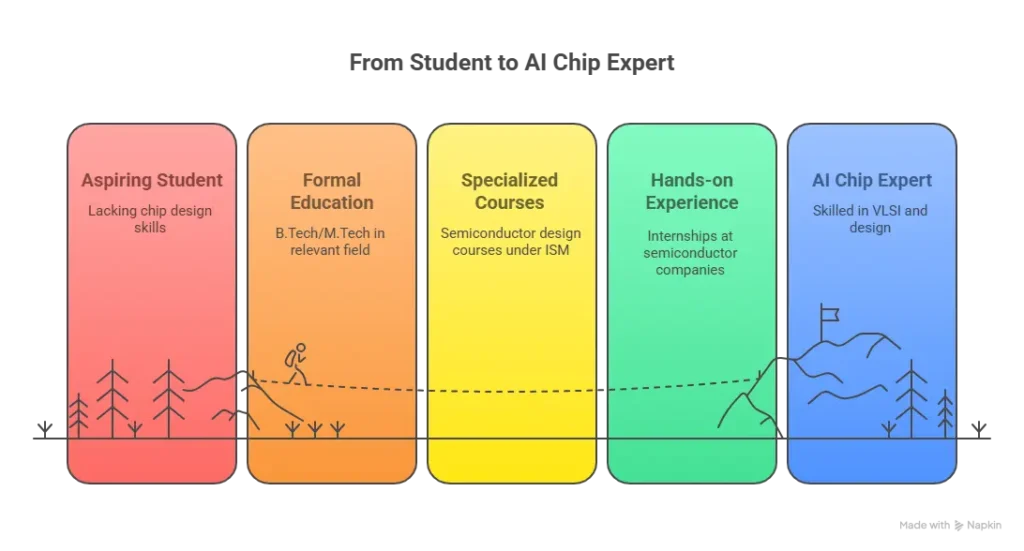|
Getting your Trinity Audio player ready...
|
This article dives into the top 6 top future jobs set to dominate by 2030: Artificial Intelligence and Machine Learning Specialists, Green Energy and Sustainability Experts, Space Technology and Exploration Professionals, Healthcare Innovators and Telemedicine Experts, Cybersecurity and Privacy Advocates, and roles in India’s booming AI Chip-Making Industry. Whether you’re a student or a young professional, discover unique insights into these high-growth sectors, learn actionable pathways to secure these roles, and understand how to prepare for a tech-driven world. From AI chip design in India to telemedicine solutions globally, equip yourself with the skills and knowledge to thrive in tomorrow’s workforce. Start your journey to a future-ready career today! with this article (6 Top Future Jobs)
Table of Contents
6 Top Future Jobs: The Changing Job Market
The World Economic Forum’s “Future of Jobs Report 2023” predicts that by 2030, over 65% of jobs will involve skills and technologies that are still evolving. Automation, AI, and digital transformation are creating roles that didn’t exist a decade ago. At the same time, global challenges like climate change and population growth are driving demand for professionals in sustainability and healthcare innovation. Let’s dive into some of the most promising career fields of the future
1. Artificial Intelligence and Machine Learning Specialists
AI is no longer a concept from sci-fi movies; it’s a reality shaping industries from healthcare to finance. Roles like AI ethicists, data scientists, and machine learning engineers are in high demand. These professionals design algorithms, ensure AI systems are unbiased, and solve complex problems using data.
Pathway: AI and Machine Learning Specialist
- Who Can Apply: Students from computer science, IT, or mathematics backgrounds (Class 12 onwards).
- Educational Steps:
- Pursue a B.Tech/B.E. in Computer Science or AI from reputed institutes like IITs or NITs.
- Take online courses in AI/ML on platforms like Coursera (e.g., Andrew Ng’s Machine Learning course) or Udemy.
- Join internships or projects to build hands-on experience in data modeling.
- Skills Needed: Programming (Python, R), statistics, and knowledge of frameworks like TensorFlow.
- Job Prospects: Roles in tech giants like Google, Microsoft, or Indian startups like Haptik. Salaries start at ₹6-12 lakh per annum for freshers.
2. Green Energy and Sustainability Experts
With the world shifting toward renewable energy to combat climate change, jobs in solar, wind, and bioenergy sectors are skyrocketing. Roles such as renewable energy engineers, climate analysts, and sustainability consultants will be crucial in building a greener planet.
Pathway: Green Energy and Sustainability Expert
- Who Can Apply: Students interested in physics, environmental science, or engineering.
- Educational Steps:
- Opt for B.Tech in Renewable Energy or Environmental Engineering.
- Learn about energy systems through certifications from platforms like edX.
- Participate in sustainability hackathons or volunteer with NGOs for practical exposure.
- Skills Needed: Knowledge of renewable energy systems, project management, and data analysis.
- Job Prospects: Work with companies like Adani Green Energy or international organizations like Greenpeace.
3. Space Technology and Exploration Careers
The space industry isn’t just for astronauts anymore. With private players like SpaceX and ISRO’s ambitious missions, roles like space data analysts, satellite engineers, and even space tourism managers are emerging.
Pathway: Space Technology and Exploration
- Who Can Apply: Students with a passion for physics, aeronautics, or engineering.
- Educational Steps:
- Study B.Tech in Aerospace Engineering from institutes like IIT Madras or ISRO-affiliated centers.
- Apply for ISRO’s Young Scientist Programme (YUVIKA) while in school.
- Pursue higher studies in satellite technology or space data analysis.
- Skills Needed: Physics, programming, and analytical skills.
- Job Prospects: Work with ISRO, private firms like Skyroot Aerospace, or global companies like SpaceX.
4. Healthcare Innovators and Telemedicine Experts
The COVID-19 pandemic accelerated the adoption of telemedicine. Future healthcare jobs will include robotics surgeons, genetic counselors, and health data analysts who use AI to predict and prevent diseases
Pathway: Healthcare Innovators and Telemedicine Experts
- Who Can Apply: Students interested in biology, medicine, technology, or healthcare management (Class 12 onwards with science background, or even non-science students for certain roles like health tech management).
- Why Choose This Field? The healthcare sector is evolving with the integration of technology, especially after the global push for telemedicine during the COVID-19 pandemic. Innovators in this space work on cutting-edge solutions like AI-driven diagnostics, robotic surgeries, and remote patient care, while telemedicine experts bridge the gap between patients and doctors through digital platforms.
- Educational Steps:
- For Healthcare Innovators (Focus on Technology and Research):
- Pursue a B.Tech in Biomedical Engineering or Biotechnology from reputed institutes like IITs, NITs, or AIIMS. Alternatively, opt for a B.Sc. in Life Sciences if you’re inclined toward research.
- Learn about medical technologies, AI in healthcare, and robotics through online courses on platforms like Coursera (e.g., “AI for Healthcare” by Stanford Online) or edX.
- Gain hands-on experience by interning at hospitals, medical startups, or research labs working on health tech solutions.
- Consider higher studies like M.Tech or Ph.D. in Biomedical Engineering or related fields to specialize in areas like medical device innovation or genetic engineering.
- For Healthcare Innovators (Focus on Technology and Research):
- For Telemedicine Experts (Focus on Digital Health and Patient Care):
- Complete a degree in Medicine (MBBS) if you aim to be a telemedicine doctor, or pursue B.Tech in Health Informatics/Computer Science if focusing on the tech side of telemedicine platforms. Non-medical students can opt for BBA in Healthcare Management.
- Take short-term certifications in telemedicine and digital health offered by organizations like the Telemedicine Society of India or online platforms like FutureLearn.
- Learn to use telemedicine software and understand healthcare regulations (like HIPAA for global roles or India’s Telemedicine Practice Guidelines) through workshops or internships with telehealth companies like Practo or Apollo 24/7.
- For doctors, pursue postgraduate courses or fellowships in telemedicine or family medicine to enhance credibility in remote care delivery.
- Skills Needed:
- Technical Skills: Knowledge of AI tools for diagnostics, wearable health tech, electronic health records (EHR) systems, and programming (Python or Java for health tech developers).
- Medical Knowledge: Understanding of basic healthcare practices, patient care ethics, and medical terminology (especially for telemedicine roles).
- Soft Skills: Empathy, communication, and problem-solving to handle patient interactions remotely and design user-friendly health solutions.
- Digital Literacy: Familiarity with video conferencing tools, mobile health apps, and data privacy protocols.
- How to Get Started Early:
- In School (Class 9-12): Focus on biology, chemistry, and physics if aiming for medical or biomedical fields. Join science clubs or participate in health-related projects (e.g., creating awareness about digital health tools). For tech-focused students, start learning basic coding and explore health tech blogs or YouTube channels like “Healthcare IT Today.”
- In College: Volunteer at local hospitals or clinics to understand healthcare challenges. Join hackathons focused on health tech innovations (many are hosted online or by universities). Build a portfolio of small projects, like designing a health monitoring app or researching telemedicine case studies.
- Networking: Connect with professionals in healthcare innovation or telemedicine on LinkedIn. Follow organizations like the Indian Medical Association (IMA) or health tech startups for updates on internships and job openings.
- Resources and Links:
- Courses and Certifications: Check Coursera (https://www.coursera.org/) for healthcare AI and telemedicine courses. Explore free resources on the National Health Portal of India (https://www.nhp.gov.in/) for telemedicine guidelines.
- Internships and Jobs: Look for opportunities on platforms like Internshala (https://internshala.com/) or directly on career pages of companies like Medtronic (for medical devices) and Practo (for telemedicine).
- Government Initiatives: Stay updated on schemes by the Ministry of Health and Family Welfare (https://mohfw.gov.in/) for digital health projects like the National Digital Health Mission (NDHM), which aims to create digital health IDs and boost telemedicine adoption.
- Job Prospects:
- Healthcare Innovators: Roles include biomedical engineers, health data analysts, robotic surgery technicians, and genetic counselors. Work with hospitals, research institutes, or companies like Siemens Healthineers and Philips. Starting salaries for freshers range from ₹5-10 lakh per annum in India, with higher potential in global markets.
- Telemedicine Experts: Opportunities exist as telemedicine doctors, health tech consultants, or digital health coordinators with platforms like 1mg, Lybrate, or government e-health programs. Salaries start at ₹6-12 lakh per annum for tech roles and higher for doctors with experience.
- Challenges and Tips:
- Challenge: High competition in medical and tech fields.
- Tip: Start building a niche by focusing on a specific area, like wearable health tech or rural telemedicine solutions.
- Challenge: Keeping up with rapidly changing technology and regulations.
- Tip: Follow health tech news on platforms like MedTech Dive (https://www.medtechdive.com/) and attend webinars or conferences on digital health.
- Challenge: Limited access to practical training or expensive education.
- Tip: Use free online resources, apply for government scholarships (like those under NDHM), and seek virtual internships with health tech startups.
- Challenge: High competition in medical and tech fields.

Why This Pathway Matters
Healthcare innovators and telemedicine experts are at the forefront of solving critical global challenges, such as access to affordable healthcare and managing chronic diseases through technology. In India, with a vast population and growing digital penetration, telemedicine is a game-changer for rural and urban healthcare delivery. By entering this field, students can make a tangible impact on society while securing a stable and rewarding career. The demand for professionals in this space is expected to grow exponentially, with the global telemedicine market projected to reach $396 billion by 2027, and India playing a significant role through initiatives like eSanjeevani (a national telemedicine service).
This pathway integrates seamlessly with the broader article on future jobs, providing students with a clear roadmap to enter the healthcare innovation and telemedicine sectors. If you have further questions or need additional details on any other career path, feel free to ask!
5. Cybersecurity and Privacy Advocates
As digital dependency grows, so do cyber threats. Cybersecurity specialists, ethical hackers, and data privacy consultants will be in high demand to protect sensitive information and ensure safe online ecosystems.
Pathway: Cybersecurity Specialist
- Who Can Apply: Students from IT or computer science backgrounds.
- Educational Steps:
- Complete B.Tech in Cybersecurity or Information Technology.
- Earn certifications like Certified Ethical Hacker (CEH) or CompTIA Security+.
- Practice on platforms like Hack The Box to build practical skills.
- Skills Needed: Networking, penetration testing, and knowledge of cyber laws.
- Job Prospects: High demand in banks, IT firms, and government agencies with salaries starting at ₹5-10 lakh per annum.
6. AI Chip-Making Industry: A Goldmine for Jobs
India is positioning itself as a global leader in semiconductor and AI chip manufacturing, a critical component of modern technology. From smartphones to autonomous vehicles, AI chips power everything. The Indian government’s push through initiatives like the India Semiconductor Mission (ISM) aims to make the country a hub for chip design and production by 2030. Major companies like Tata Electronics, Vedanta, and global giants like TSMC are setting up plants in India, creating thousands of jobs.
Job Roles in AI Chip-Making Industry in India:
- Chip Design Engineers: Design and develop AI-specific chips for various applications.
- Fabrication Technicians: Work in cleanroom environments to manufacture chips.
- AI Hardware Architects: Focus on integrating AI capabilities into hardware systems.
- Testing and Validation Engineers: Ensure chips meet performance and safety standards.
- Research and Development Scientists: Innovate next-generation chip technologies.
Why This Industry Matters for Students in India?
The semiconductor industry is expected to create over 1 lakh direct and indirect jobs in India by 2027, as per government estimates. With global demand for AI chips projected to reach $300 billion by 2030, this sector offers lucrative salaries (starting at ₹8-15 lakh per annum for freshers) and long-term career growth.
How Students Can Prepare for Future Jobs: A Step-by-Step Guide
The future job market may seem daunting, but with the right preparation, students can position themselves as top candidates. Below are detailed pathways for various emerging fields, including AI chip-making in India. These steps are simple, practical, and tailored for students at different stages of their education.
General Skills for All Future Jobs
Before diving into specific career paths, here are foundational skills every student should develop:
- Digital Literacy: Learn basic coding (Python, Java), data analysis, and familiarity with tools like Microsoft Office and Google Suite.
- Critical Thinking: Solve problems logically and think creatively.
- Communication: Build strong written and verbal skills to collaborate in diverse teams.
- Adaptability: Stay open to learning new technologies and trends.
Pathway: AI Chip-Making Industry in India
- Who Can Apply: Students from electronics, electrical engineering, or computer science streams (Class 12 with science).
- Educational Steps:
- Pursue a B.Tech/M.Tech in Electronics and Communication Engineering (ECE) or VLSI Design from institutes like IIT Bombay, IISc Bangalore, or NITs.
- Enroll in specialized courses on semiconductor design offered by the Indian government under ISM or platforms like NPTEL.
- Gain hands-on experience through internships at companies like Intel India, Qualcomm, or Tata Electronics. Many of these firms collaborate with universities for placements.
- Skills Needed: Knowledge of Very Large Scale Integration (VLSI), circuit design, programming (Verilog, VHDL), and problem-solving.
- How to Get Started Early:
- In school, focus on physics and mathematics. Join robotics or electronics clubs.
- Use free resources like YouTube channels (e.g., “Electronics for You”) to understand chip basics.
- After Class 12, apply for scholarships under government schemes like ISM to fund your education.
- Job Prospects: Entry-level roles at semiconductor firms offer ₹8-15 lakh per annum, with rapid growth potential. Look for openings on job portals like Naukri.com or company career pages of TSMC India and Vedanta.

Resources and Links for Students to Get Started
- Government Initiatives for AI and Chip-Making: Check the India Semiconductor Mission website (https://www.ism.gov.in/) for updates on training programs and scholarships.
- Free Learning Platforms: Use NPTEL (https://nptel.ac.in/), Coursera (https://www.coursera.org/), and edX (https://www.edx.org/) for courses in AI, cybersecurity, and more.
- Job Portals: Explore Naukri.com (https://www.naukri.com/) and LinkedIn (https://www.linkedin.com/) for internships and entry-level roles in emerging fields.
- ISRO Opportunities: Visit ISRO’s official site (https://www.isro.gov.in/) for programs like YUVIKA and career openings
Challenges and How to Overcome Them to find batter way for 6 Top future jobs
While the future job market is full of opportunities, students may face challenges like lack of access to quality education, financial constraints, or confusion about career choices. Here are some tips:
- Leverage Free Resources: Use online platforms and government schemes to learn at low or no cost.
- Seek Mentorship: Connect with professionals on LinkedIn or through college alumni networks for guidance.
- Start Small: Focus on building one skill at a time. For instance, learn basic coding before diving into AI.
- Stay Updated: Follow tech news on platforms like Widelamp (https://widelamp.com/) to understand industry trends.
6 Top Future Jobs are really important for and its essential for everyone who makes the career in the technology field.




